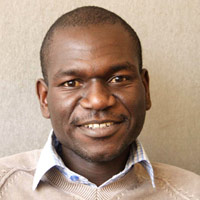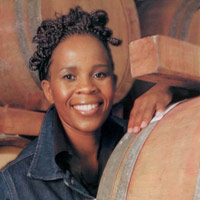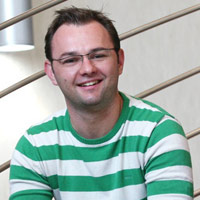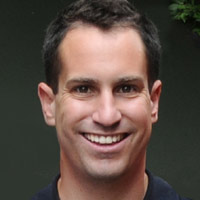In this section: Sian Elliot, Adam Hoets, Errol Masinga, Nontsikelelo Biyela, Andile Mazwai and more…

Sian Elliot and Adam Hoets, Designers, co-founders Willowlamp
The ah-ha moment for Willowlamp came while Sian Elliot and Adam Hoets were stuck in traffic.
Hoets, an architect by training, had been toying with the idea of using the ball chain that Elliot used in her jewellery designs to form a woven cover for a lamp. They had already tried to hang the chains using a traditional fastening clip but they were unhappy with the result. That day in the car, Elliot came up with the idea of making their own fastener using a technique of laser-cutting that she had been using in her jewellery.
It worked. Ever since then, Willowlamp’s success has been growing exponentially. They took the Elle Décor Lighting Design of the Year Award for 2006-7 and 2007-8 and were the Elle Décor Designers of the Year for 2009. Now their designs are sold in South Africa, the United States and Britain and will soon be in Germany, Austria and Switzerland.
What did you do in the traffic this morning? — Eamon Allan
Lunch spot: Romy’s Ethiopian Canteen, Bez Valley, Johannesburg

Errol Masinga, Transformation coordinator, Alexander Forbes
Errol Masinga didn’t start out as a panelbeater. After completing his marketing qualification at the Vaal University of Technology, he joined the Chamber of Commerce and Industry Johannesburg as part of their learnership programme. It was there that Masinga’s passion for the development of small and medium-size enterprise was fostered. Seeing a gap in the automobile repair market in 2003 he spearheaded the Alexander Forbes’s Adopt A Panel Shop project.
The project selects disadvantaged black-owned panelbeating business and helps them upgrade their infrastructure and facilities so they are able to qualify for the necessary grading and approvals. But it’s a bigger challenge than merely providing equipment and facilities. Qualifying as registered paintless dent repairers, non-structural repairers or major-structural repairers — the various grades required to receive business from the insurance industry — requires intensive skills development as well as management and systems upgrades. — Jane Steinacker
Lunch spot: The Butcher Shop & Grill, Nelson Mandela Square, Johannesburg

Nontsikelelo Biyela, Winemaker
When she finished school, Nontsikelelo Biyela was a domestic worker. Biyela grew up in the small village of Kwavuthela in KwaZulu-Natal, and she says that after matriculating, there were just not many options open to her.
But in 1999, that all changed. She was offered a bursary to study viticulture at Stellenbosch University based on her matric results. It was then that she began her foray into the white, male-dominated wine industry.
Biyela says that she can count the black wine makers in the country on one hand. It’s testament to her tenacity that when she began her studies she could no speak Afrikaans, the medium in which her course would be taught.
She apprenticed at Delheim and in 2004, she got a job at Stellekaya winery in Stellenbosch where she has been ever since. Now her work has taken her to the US, Germany, Sweden and the UK and her wines are being exported to France and Holland. — Eamon Allan
Lunch spot: 95 Keerom, Gardens, Cape Town

Andile Mazwai, Chief executive, BJM
Andile Mazwai spent his formative years tending cattle in rural Transkei. How does that translate into big business? It doesn’t. Mazwai says he harbours some nostalgia for his days as a herdboy but points out that this kind of hindsight can only be seen from the luxury of his current position as a successful businessman.
Mazwai’s career began with Barnard Jacobs Mellet Securities where he was equity-sales trader. He went on to found Mazwai Securities in October 2001. Just two years later, his company merged with Barnard Jacob Mellet in a Black Economic Empowerment deal in which the Mazwai Consortium bought 10% of BJM Holdings. He is chief executive of BJM, listed as South Africa’s largest independent stockbroker and rated number one in the 2008 Financial Mail survey of stockbrokers. — Eamon Allan
Lunch spot: Espresso, Parkhurst, Johannesburg

Rudo Botha, Co-founder, REX Creative
If Rudo Botha could have it any other way he would opt to be a teacher or a performing artist. If you had to ask his peers, they’d tell you he’s a rare blend of artist and strategist.
But to the guys who are paying the bills, his clients, he’s the guy with a solid reputation for delivering iconic branding and design solutions. Botha, whose clients range from Coca-Cola to South African Breweries and a niche independent record label based in Belgium, says he’s doing what he loves: building his own design business using his creative flair. And when he’s not designing brands, he’s working on the redesign of an indigenous ecosystem in the Cradle of Mankind. — Jane Steinacker
Lunch spot: The Local Grill, Hurlingham, Johannesburg

Mfundo Thango, Founder, KwaZulu-Natal Youth in Business Cooperative
When Mfundo Thango started Mpilende Foods, his food production and processing company, and his food distribution and warehousing business, Bantu Batho Management Services, he faced a lot of challenges. That’s exactly why Thango decided to pass on what he learned to other micro enterprises.
In April of 2007, Thango started up the KwaZulu-Natal Youth in Business Cooperative. It now boasts a 500-member strong following , in which all types of businesses from cattle, chicken, maize and goat farmers to security and cleaning groups go to for assistance in building up their own businesses. They come away with everything from business plans to marketing material and mentorship from Thango. This work landed Thango the Black Business Quarterly’s Young Visionary Achiever Award for 2009. — Jane Steinacker
Lunch spot: Europa, Village Walk, Johannesburg

Pria Chetty, Founder, Chetty Law
What do you get when you cross a lawyer and an activist? Pria Chetty has been pioneering the field of technology and innovation law. She helps non-profit organisations, government and companies create new legal frameworks that encourage more open and collaborative approaches to business and content.
At the sprightly age of 30 she has gained the respect of her peers with an understanding of how the law can be used to enable access to knowledge, education and technology. She is part of numerous research projects to review copyright and intellectual property in Africa, and her firm, Chetty Law, practices law in an innovative, progressive way.
In the near future Chetty and Dirk Visser will host ‘Our Generation Will Deliver,” which is a gathering of leaders in business, government and civil society with the intention of brainstorming South Africa’s leadership challenges. The product of the unlikely pairing of lawyer and activist, Chetty is a dynamic package. — Eamon Allan
Lunch spot: Primi Piatti, anywhere

Silas Howarth, Director, Sexpo
‘Sex sells, and the success of Sexpo proves it,” Silas Howarth says.
In 2006, Howarth and his two younger brothers, Cairo and Calvin, realised that South Africa was lacking a fun and entertaining expo aimed exclusively at the adult market. They researched adult expos around the world and chose Sexpo — an internationally recognised health, sexuality and lifestyle event that originated in Australia.
The next year, the brothers brought the event to Johannesburg. Sexpo, Howarth says, broke exhibition records with over 32 000 people attending just the premier that first year, with more than 100 000 coming through the doors. Now the brothers have added events in Cape Town and Durban making Sexpo one of the fastest growing expos in the country, with over 150 exhibitor stands and various sexual wellbeing workshops. — Eamon Allan
Lunch spot: La Campagnola, Bryanston, Johannesburg

Dumisani Gumbi and Isabelle Rorke, Directors, Anamazing Workshop
Isabelle Rorke got into animation almost by accident. After editing a children’s nature conservation magazine and working in broadcasting on Morning Live, Rorke noticed the potential for animation to reach a broad audience and, at the same time, be culturally relevant in South Africa.
Meanwhile, Dumisani Gumbi was looking at making a Shaka Zulu cartoon. He dropped out of Harvard University and went to film school instead.
The two met through a mutual friend and found that they had a common purpose: to produce animated features that are reflective of South Africa and the continent. In 2000, they joined to form Anamazing Workshop.
Backyard Shorts — their production of 13 five-minute short animations, each with African characters and narratives — went on to win Best Animation at the South Africans Film Awards.
Anamazing received the Africa Growth Institute’s SMME award for most innovative company in 2008 and the company was recently selected as high-impact entrepreneurs with the US-based Endeavor programme, alongside heavy hitting entrepreneurs such as Nkhensani Nkosi and Vinny Lingham, for their potential to make some serious cash out of cartoons. — Eamon Allan
Lunch spot: Bayleaf and Sage in Blue Bird Centre, Atholl; Orient, Melrose Arch, Johannesburg